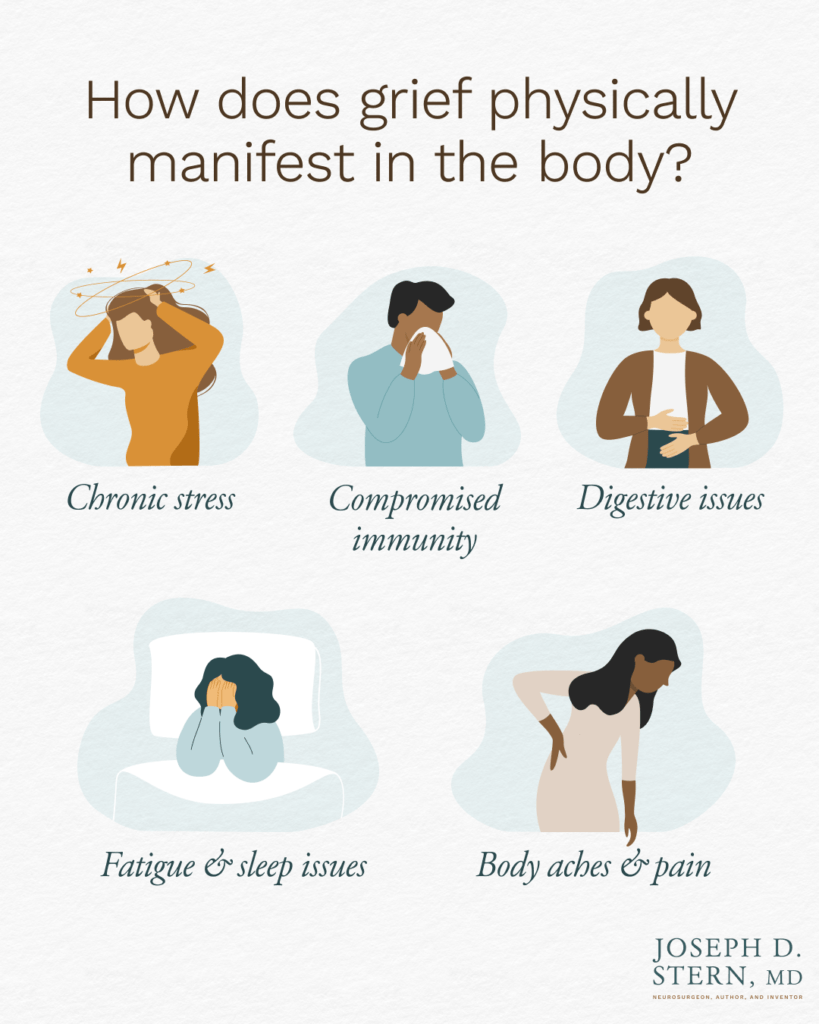Grief is the body’s response to the loss of someone you deeply value and, however common, is a complex and diverse emotion. The mental and emotional effects of grief are often discussed, but many people are not aware of grief’s physical impacts and the potentially serious health implications of experiencing this emotion.
Knowing some common ways grief physically manifests and how they can compromise your health can help you identify these effects and get appropriate help from doctors and therapists.
Cardiovascular issues
Due to the heightened state of stress brought upon by grief, the risk of a heart attack is highest in the first 24 hours after the loss of a loved one and, people aged 60 or older have more than twice the risk of heart attack or stroke within 30 days of losing their partner. The increase in blood pressure puts the bereaved at greater risk for blood clots and some may experience “broken heart syndrome,” which is caused by a disruption in blood flow in the heart. While broken heart syndrome will likely resolve as you are able to process grief, any chest pain or shortness of breath should be immediately addressed by a doctor as it may indicate urgent cardiovascular distress.
Chronic stress-related endocrine system issues
Losing a loved one may create an identity crisis as we are forced to reassess how we fit into the world without that person. The brain perceives this as a threat to our very existence and triggers the “fight or flight” response, flooding the body with stress hormones. If not properly managed, grief can cause chronic stress, wreaking havoc on the endocrine system, potentially causing chronic fatigue, diabetes, obesity, depression, and immune disorders. For some, grief may increase vulnerability to substance abuse and addiction.
Compromised immunity
To help protect the body during stressful situations, like grieving a loved one, cortisol is released to temporarily reduce bodily functions that would not be needed in a fight-or-flight situation. In short spurts, this can help our immune system but, over time, the white blood cells which the body relies on to fight off infection are reduced by this hormone imbalance, leaving you more susceptible to illness. Sustained high levels of stress can eventually lead to the development of serious immune system diseases such as fibromyalgia, rheumatoid arthritis, and lupus.
Sustained high levels of stress can eventually lead to the development of serious immune system diseases such as fibromyalgia, rheumatoid arthritis, and lupus.
Body aches and pain
Grief often manifests as physical pain in the body with symptoms including headaches, back pain, joint pain, and stiffness. Pain is caused by the overabundance of stress hormones released during the grieving process, stunning the muscles that come in contact with the hormones. These symptoms will likely be temporary unless there is a deeper issue.
Fatigue and sleep issues
Sleep affects our physical, mental, and emotional functions and is essential for every process in the body to perform efficiently. Grief commonly disrupts sleep, adding additional physical challenges when the bereaved are already working through sadness, anxiety, and emotional exhaustion.
Digestive issues
During the grieving process, some people note having little-to-no appetite while others may be inclined to seek comfort in food. Whatever the case, your digestive system may be notably sensitive. Nausea, binge eating, and irritable bowel syndrome are common, temporary symptoms you may experience while grieving. Prolonged digestive issues and unstable eating habits may lead to more significant health problems and should be shared with a trusted medical professional.

Grief management
Grief has a way of rewiring our brains, and if we are not careful, grief can become cyclical. The brain’s reward receptors may be triggered by a memory making “letting go” of a loved one that much more challenging.
You or a loved one may feel debilitated by grief and it may be difficult to see a future beyond it. Take heart in knowing that as isolating as grief feels, it is a universal emotion that connects all of humanity. Coping with grief is fluid from person to person but there are some foundational methods to find yourself again:
- Follow a daily routine. It can be the same routine you had before you suffered a loss or you may wish to create new healthy habits.
- Nutritious diet and exercise will limit negative effects of grief-induced stress and fuel your body’s physical, mental, and emotional healing efforts.
- Talk about your grief. Whether it is to friends and family or a mental health professional, connecting with other people will help you feel supported as you find your new normal.
- For immediate help and referrals to services for mental health or substance use, you may contact the SAMHSA hotline by calling 1-800-662-4357 to receive free, confidential help.
How to help others coping with grief
When a loved one is grieving, you may feel helpless and unsure of how you can help. We encourage you to dive into resources that can develop your understanding of the grieving process and equip you with tools and methods to encourage and support those experiencing grief.
About Joseph Stern, MD
My name is Dr. Joseph Stern and I am dedicated to building a community centered around healing by connecting patients, their families and caregivers, and medical professionals. In my book, Grief Connects Us: A Neurosurgeon’s Lessons on Love, Loss, and Compassion, I explore the impacts of grief on patients, their families, and the medical community. I invite you to explore more resources, learn more about my book, and get involved.

